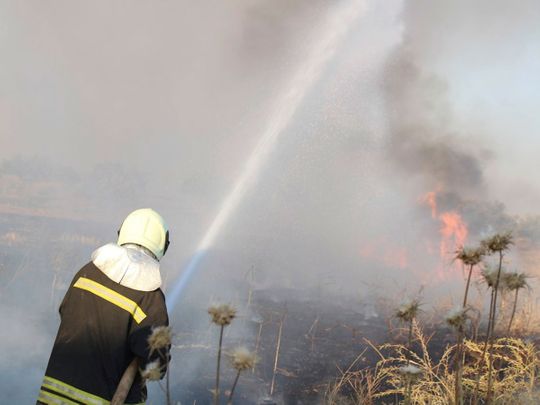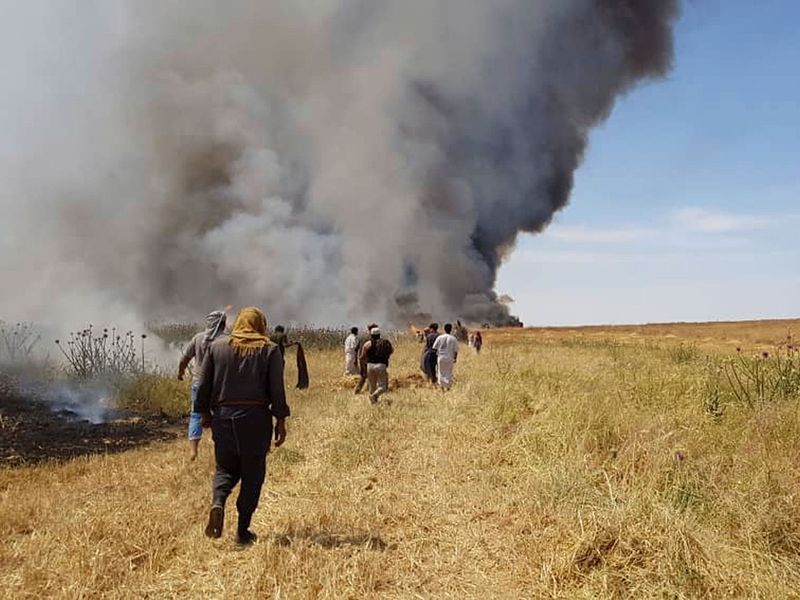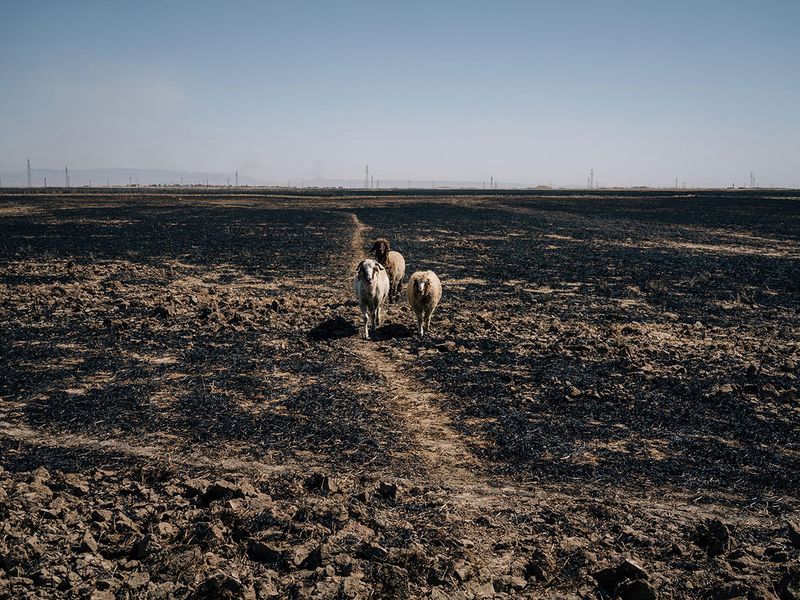
Tal Abtakh - This was supposed to be the year the farmers of eastern Syria and Iraq bounced back. For the first time in a decade, neither war nor drought had intervened to deter what promised to be a bumper harvest. Fields of golden wheat rippled across the vast lands once ravaged by the militant fighters, the most fertile area of the region that in centuries past served as the breadbasket of the known world.
Then came the mysterious crop fires - blamed on and claimed by Daesh, but perhaps not entirely the work of the militants.
20000 acres
Incinerated in SyriaStarting in early May, tens of thousands of acres of farmland have been burned across an expanse of territory stretching from the Iranian border in the east to near the Mediterranean coast in the west. The scorch marks across the landscape are visible from satellites. The plumes of smoke rising on the horizon recall the U.S.-led airstrikes that pummeled much of the area a few years ago.
The loss of income for farmers who have suffered years of deprivation and displacement heralds new misery and potentially new strife in communities that had hoped an end to war was in sight.
"The whole family, 24 people, was just waiting for the harvest to come and now it's gone," said Mohammed Abbas Al Jaghjagh, 75, an Arab farmer in the hamlet of Tal Abtakh, near the Syrian town of Tal Hamis, who had lost his crops in a fire the day before.
Outside, his blackened fields stretched for as far as the eye could see. "It's been 10 years since we had a harvest as good as this and now we've got nothing."
The fires come as a reminder that Daesh retains the capacity to spark mayhem with seemingly little effort, exploiting the unresolved grievances and disputes that contributed to its emergence - and could yet help it rise again.
20000 acres
of crops lost in IraqDaesh claimed responsibility for the earliest of the fires and urged its followers to ignite more.
"The harvest season is still long, and we tell the soldiers of the Caliphate: you have before you millions of dunams of land planted with wheat and barley, which are owned by apostates," said the claim, published by Daesh's Al Naba newsletter, exhorting supporters to set more fires.
An orgy of burning followed.
Since the fires began, 20,000 acres of wheat and barley have been incinerated in Syria, while in Iraq, fires have broken out across 134,000 acres of land, with 20,000 acres of crops lost, according to figures issued last week by authorities in each country.
Is it Arabs? We can't say. Is it Kurds? We can't say. Is it the government? We can't say. Is it Turkey? We can't say. Is it foreigners? We can't say. There are many enemies.
Others piggybacking
Many of the fires are almost certainly the work of Daesh, in keeping with the scorched earth strategy the group adopted after it began to lose territory, said Peter Schwartzstein, a fellow at the Center for Climate and Security.
"They are a means of keeping the countryside unstable and ripe for it to operate," he said. "The rationale is: If we can't have this land, neither can anyone else."
Few, however, believe that Daesh is responsible for all the burnings, he said. "A chunk of it is almost certainly others piggybacking on the phenomenon. It looks as if these ISIS-related fires have provided a useful foil for others to pursue their goals."

In both Syria and Iraq, these are areas where land has changed hands multiple times in recent decades, creating disputes over ownership that are hard to untangle.
The Baathist regimes of the Assad family and former Iraqi president Saddam Hussein settled Arabs on Kurdish lands. Kurds displaced Arabs during the wars of this century. The Daesh's rampage ejected Kurds, whose lands were taken over by Arabs. The defeat of the militants saw Kurds return and Arabs leave again.
There are also rivalries between Arabs who supported Daesh and those who did not. People on all sides who have returned to the land have planted crops on the lands of those who are displaced, detained or dead. Daesh claim potentially provides cover for anyone wishing to exact revenge or deny land use to their rivals.
The military defeat of the militants has meanwhile brought no political solutions to the bigger question of who should govern these long-disputed areas. Grievances fester, and blame has been leveled among all players to the conflicts.
Arabs and Kurds have accused one another
Arabs and Kurds have accused one another both in Syria and Iraq. Some fires in Iraq have been set in areas far from the traditional Arab-Kurdish land disputes, drawing allegations that Iran was behind them in a bid to force Iraq to buy Iranian wheat.
In Syria, the suspicions are complicated by a new policy adopted by the self-proclaimed Kurdish administration in the northern part of the country it controls - and pushed by the United States - to prevent wheat from being sold to Syrian government-held areas. This gives the government also an incentive to burn crops, said Salman Barudo, who heads the Kurdish administration's agriculture committee.
"We cannot say the regime and Daesh are working together, but they share the same interest in not seeing the success of this area," he said.
A separate set of fires that have burned crops in the northwestern Syria province of Idlib has been attributed by the United Nations to fighting between rebels and government forces, who are waging an offensive to reclaim the area. Videos released by government opponents have shown phosphorous shells fired by loyalist forces exploding in wheat fields, and the rebels have accused the government of deliberately seeking to destroy crops in opposition areas.

Some Syrian opposition figures have blamed the Syrian Kurds for the burnings, alleging that they are seeking to punish Arabs who supported either Daesh or, in an earlier phase, the Kurds' Syrian rebel foes.
The most likely culprit in Syria also is Daesh, although other explanations are possible, said Nicholas Heras, who studies the region at the Center for a New American Security. "At this point in time the most logical aspect of the burning of wheat fields is that ISIS is using it as a tactic to punish its enemies," he said.
At least some of the fires may also have been triggered by the unusually hot weather, with temperatures surpassing levels not normally reached before the harvest, which is just now beginning. But government officials and experts say there are way too many to be explained by natural causes.
Farmers in tears
What is certain is that the fires are newly impoverishing the farmers whose crops have been lost.
To see the fire coming at you from five kilometers away and you can do nothing. We just took our children and our animals and we ran.
The women of the Jaghjagh family wept as they greeted journalists late last month. Scorched fields lay all around, some still smoldering from the blaze that had destroyed nearly 2,500 acres of crops, including the 75 acres they had planted. "We lost everything" sobbed Maha Jaghjagh, one of Jaghjagh's wives.
Inside, farmer Jaghjagh sat stoically, cross legged on the floor surrounded by grandchildren and visitors from his extended family. "It's like a funeral," he said.
"To see the fire coming at you from five kilometers away and you can do nothing," he added. "We just took our children and our animals and we ran."
He was reluctant to apportion blame. The issue is sensitive for everyone in the area, which has changed hands three times in the past four years - from the Syrian government to the Islamic State and now to the Kurdish-led, U.S.-backed Syrian Democratic Forces. Many people found themselves on the wrong side of the fight and have suffered as a consequence.
"We can't say who is doing it," he said. "Is it Arabs? We can't say. Is it Kurds? We can't say. Is it the government? We can't say. Is it Turkey? We can't say. Is it foreigners? We can't say. There are many enemies, and we have no proof."












